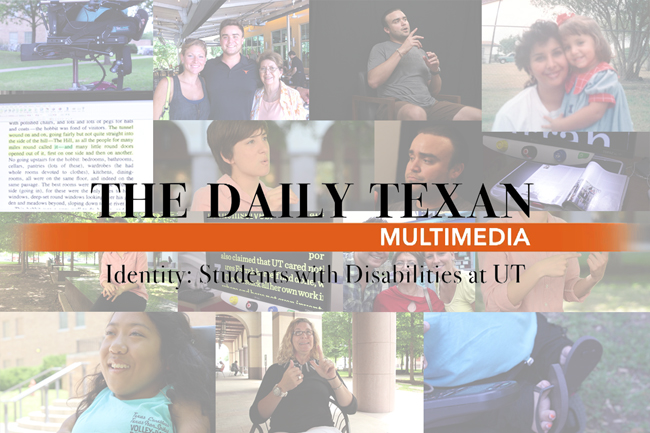The University’s Office for Services for Students with Disabilities has about 2,100 students, which represent about 4.2 percent of UT's student body. Many of these students are working hard to make their presence and influence known around campus, despite their small population.
The disabilities are broken down by the office into categories with specialized staff members assigned to each group of students.
Graphic by Jack Mitts / Daily Texan Staff
Megan Kareithi manages the Assistive Technology Lab where students can access various technologies to help them with their studies and testing. Technologies such as screen readers and enlargers can assist visually impaired students, and students with various learning and attentional disabilities.
Disability services coordinator Laina Hubbard oversees students with learning, attentional, psychological and medical disabilities. Examples of learning disabilities include dyslexia, reading disorders, math disorders, written expression disorders and processing disorders. The most common types of attention disabilities are Attention Deficit Disorder (ADD) and Attention Deficit Hyperactivity Disorder (ADHD), and often, learning and attentional disabilities are combined with psychological disabilities such as anxiety and depression.
Nearly 75 percent of students registered at the SSD have learning, attentional or psychological disabilities. These disabilities often go unnoticed by peers and professors, and many students struggle to accept for themselves that they have one of these disabilities.
Click through the title to view the transcript of the interview.
Hubbard came to UT after working as a tutor in different situations with children with learning and psychological disabilities. She began advocating for students and helped provide support services for students with Asperger’s Syndrome. When joining the staff at UT, she saw that there was not a lot of support for students with Asperger’s at UT, and she set up programs to help get that support.
Lisa Guerra is a senior history student with a minor in government. She works as an Advocacy Policy Director in Student Government, and she focuses on spreading awareness of students with disabilities on campus. Guerra’s goal is to advocate for students, educate them on their rights and pass legislations helping them receive more access and services.
Lauren Kinast, associate director of Services for Students with Disabilities, focuses on deaf and hard of hearing students and coordinates sign language interpreters, captioning and transcribing services, as well as arranging other accommodations. Along with providing access to students, one of Kinast’s biggest challenges is recruiting more deaf and hard of hearing students and building their community within UT.
One of the largest challenges deaf and hard of hearing students face is communication in the classroom and with their peers. UT offers accommodations by providing interpreters, real time translation services and other options, but often deaf and hard of hearing students still struggle in becoming involved with college life and still face communication gaps in their college experience.
Oscar Ocuto, an educational psychology doctoral student, researches how deaf children from hearing families develop critical thinking skills. Ocuto works on a research team under Dr. Stephanie Cawthon.
“Pepnet 2 is a federally funded grant that enables us to study outcomes in deaf and hard of hearing children who are going through the transition process,” Ocuto said. “They’re getting ready to begin life after high school whether it’s in the workforce, continuing their education, or just living independently.”
Other students struggle less with communication and more with the physical challenges presented every day on campus. Emily Shryock, the disabilities services coordinator at the SSD, works primarily with students who are visually impaired or have medical and mobility disabilities. These students often face more tangible struggles, such as navigating campus.
Psychology freshman Alejandrina Guzman is in the process of applying to add radio-television-film to her major. She has diastrophic dysplasia, a disorder of cartilage and bone development.
All of these students and staff face challenges and roadblocks every day, but they work tirelessly to improve the University for themselves and for those after them. Each is unique and makes a difference in the world around them by not allowing themselves to be defined by their disability.
















